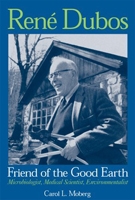
The Rockefeller University, one of Weill Cornell Medical College's Tri-Institutional partners, is defined not only by its history of biomedical research, but also in part by its location. Founded by John D. Rockefeller, a capitalist and philanthropist closely associated with New York City, The Rockefeller University was created to deal with infectious diseases that, although not completely unique to urban environments, shaped the history of the city and the lives of its residents.
One hundred years to the day from the opening of The Rockefeller University's Founder's Hall, the final 2005-2006 lecture of the Heberden Society honored René Dubos, the Rockefeller scientist who pioneered the idea that the health of organisms and human beings depends on the health of their surrounding environment. The lecture was delivered by Dr. Carol Moberg, a senior research associate in the laboratory of Ralph M. Steinman at The Rockefeller University where she specializes in research and writing about 20th-century biomedical sciences.
"[Dubos'] philosophy was that a life organism could be understood only by its relationship with everything around it," Dr. Moberg said.
Although Dubos is credited with authoring the well-known phrase "Think globally, act locally" and won a Pulitzer Prize for his work, Dr. Moberg described him as a man led to science by chance events.
The first was Dubos' diagnosis of rheumatic fever as a boy—the "dread disease of youth," in his words—that left him bedridden for two years and had an enormous physical and mental impact on him. In addition to being denied placement in the French civil service due to a heart lesion, Dubos also developed anxiety as a result of the chronic condition. He learned to function alone through books and long, contemplative walks in the countryside north of Paris.
The second event was a chance encounter with biochemist Selman Waksman aboard the ship Rochambeau while Dubos was immigrating to the United States. Waksman invited Dubos to study at Rutgers, where he would receive his doctoral degree in 1927.
Dubos then joined The Rockefeller University in the lab of Oswald Avery, whose discovery of the "transforming principle" with Maclyn McCarty and Colin MacLeod would lay the foundation for modern DNA research and earn him the Avery the Lasker Award from the American Public Health Association in 1947.
Over the course of his lifelong career at Rockefeller, Dubos' work in bacteriology would contribute to enormous advances in the field of antibiotics and the battles against pneumonia and tuberculosis.
"He pioneered two ideas that redirected Western medicine," said Dr. Moberg. "The first is that perfect health is a mirage and the second is that complete freedom from disease is almost impossible."
As Dubos aged, he gradually began to apply the tenets of bacteriology—specifically the coexistence of both good and bad microbes within an organism—on a greater ecological level. With the 1969 publication of "So Human an Animal," Dubos would win the Pulitzer Prize and become a leading figure in the environmental movement.
Dubos would ultimately publish more than 20 books that focused not only on bacteriology and soil science but also on psychology, genetics, public health and the environment.
Following the lecture, several Rockefeller professors in attendance offered their personal recollections of Dubos, a man who was described as at once shy and reclusive but also a monumental figure in the modern environmental movement.
The Heberden Society was established at Weill Cornell in 1975 by a group of medical interns and residents who were interested in promoting the history of medicine. The society, which sponsors three lectures during each academic year, is named after Sir William Heberden the younger (1767-1845), who served as physician to King George III of England. King George III was the sovereign who granted the charter for The New York Hospital.

